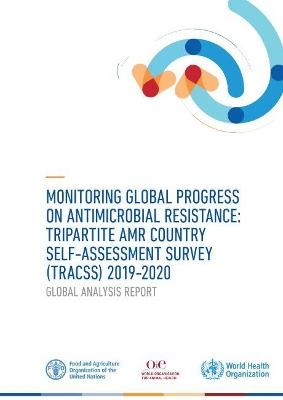
Monitoring global progress on antimicrobial resistance
tripartite AMR country self-assessment survey (TrACSS) 2019-2020, global analysis report
Seiten
2021
Food & Agriculture Organization of the United Nations (FAO) (Verlag)
978-92-5-134078-3 (ISBN)
Food & Agriculture Organization of the United Nations (FAO) (Verlag)
978-92-5-134078-3 (ISBN)
Highlights the need to provide technical and financial support to lower-income countries, and proposes a clear rationale to policymakers based on a robust assessment of the economic and humanitarian impact of addressing antimicrobial resistance.
Antimicrobial resistance (AMR) is a grave threat to human health and economic development[1]. Countries are at different stages in responding to the growing threat posed by AMR. Some countries, including many European countries, have experience with AMR policies in human and agricultural sectors for more than two decades. Others have only recently acted to contain AMR. WHO, FAO, OIE developed a Global Action Plan on AMR (GAP) in 2015 as a cross-sectoral approach to combatting AMR. All countries approved the GAP and agreed to adopt National Action Plans on AMR by 2017. The Tripartite Organisations have developed a framework for monitoring and evaluation to assist with the achievement of GAP, and created a national self-assessment survey containing questions structured around the objectives of the GAP. The first wave of this survey was sent to WHO's 194 member countries in late-2016. The survey instrument was subsequently revised and a second wave was initiated in late-2017.In this report, we analyze countries' responses to the second wave of the tripartite survey and describe the current level of global progress on AMR. We convey progress achieved towards the goals of the GAP across WHO regions and across country income groups to identify differences in progress and explore progress in relation to key agricultural sector indicators to examine whether the presence of a strong agricultural sector impacts progress made towards One Health goals at the national level
Antimicrobial resistance (AMR) is a grave threat to human health and economic development[1]. Countries are at different stages in responding to the growing threat posed by AMR. Some countries, including many European countries, have experience with AMR policies in human and agricultural sectors for more than two decades. Others have only recently acted to contain AMR. WHO, FAO, OIE developed a Global Action Plan on AMR (GAP) in 2015 as a cross-sectoral approach to combatting AMR. All countries approved the GAP and agreed to adopt National Action Plans on AMR by 2017. The Tripartite Organisations have developed a framework for monitoring and evaluation to assist with the achievement of GAP, and created a national self-assessment survey containing questions structured around the objectives of the GAP. The first wave of this survey was sent to WHO's 194 member countries in late-2016. The survey instrument was subsequently revised and a second wave was initiated in late-2017.In this report, we analyze countries' responses to the second wave of the tripartite survey and describe the current level of global progress on AMR. We convey progress achieved towards the goals of the GAP across WHO regions and across country income groups to identify differences in progress and explore progress in relation to key agricultural sector indicators to examine whether the presence of a strong agricultural sector impacts progress made towards One Health goals at the national level
| Erscheint lt. Verlag | 30.6.2021 |
|---|---|
| Zusatzinfo | col. figs, tables |
| Verlagsort | Rome |
| Sprache | englisch |
| Themenwelt | Medizin / Pharmazie ► Gesundheitswesen |
| Medizin / Pharmazie ► Medizinische Fachgebiete ► Mikrobiologie / Infektologie / Reisemedizin | |
| Studium ► Querschnittsbereiche ► Prävention / Gesundheitsförderung | |
| Naturwissenschaften ► Biologie ► Mikrobiologie / Immunologie | |
| Wirtschaft | |
| ISBN-10 | 92-5-134078-1 / 9251340781 |
| ISBN-13 | 978-92-5-134078-3 / 9789251340783 |
| Zustand | Neuware |
| Haben Sie eine Frage zum Produkt? |
Mehr entdecken
aus dem Bereich
aus dem Bereich
das Manual zur psychologischen Gesundheitsförderung
Buch | Hardcover (2023)
Springer Berlin (Verlag)
39,99 €
Orthomolekulare Medizin in Prävention, Diagnostik und Therapie
Buch | Hardcover (2022)
Thieme (Verlag)
71,00 €


